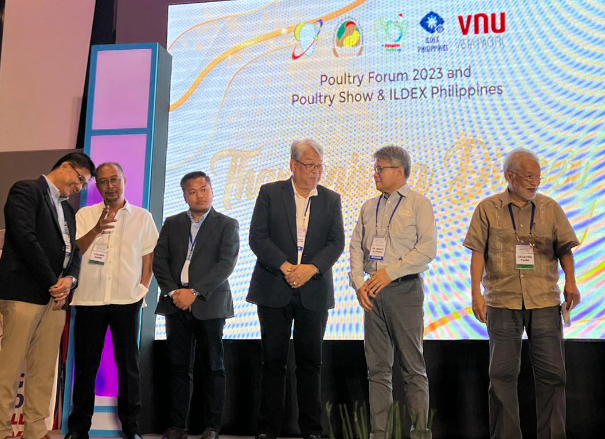The Department of Agriculture (DA) will raise by five times in five years the local production of livestock and poultry which will be a Marcos legacy that reverses any record of excessive importation in order to benefit Filipino farmers.
As a marching order from President Ferdinand R. Marcos Jr, also DA secretary, government will pursue all means to raise livestock and poultry production to achieve food security, according to DA Agriculture Undersecretary Deogracias Victor B. Savellano. This will go along with raising farmers’ profit and lowering farm product prices while ensuring availability of sources of protein for consumers.
At the recent Poultry Forum 2023, Savellano said that as food security is national security, raising local agricultural production will be prioritized. It will be realized through a consultative approach to governance.
“Recommendations from various sectors of our agriculture is currently being heard and studied on what, where, and how government actions are to be applied to boost our poultry sector,” he said.
“We have started to meet with stakeholders to strategize a common direction and priorities in order to significantly increase our local food production, making it efficient, robust, and profitable for farmers.”
The same assurance of consultative governance was given by Savellano during an earlier convention of the National Federation of Hog Farmers Inc.
“We will find ways to produce more to lessen importations. By consulting with livestock associations on how much each sector can produce, (we will know) the actual demand. It will be the consideration in determining the minimal quantity” of imports.
Importation in previous years has brought huge opportunity losses for the local poultry industry. DA aims to reverse these losses into gains.
Chicken meat importation has been consistently rising from 45.772 million kilos in 2008 to 67.264 million in 2009, 101.957 million in 2010, 127.227 million in 2011, and 411.069 million in 2022.
United Broilers and Raisers Association (UBRA) Chairman Gregorio San Diego said during the same poultry forum that direct impact of this importation is displaced local production totalling to a whopping P58.286 billion (299.366 million broilers).
Displaced too are 315.122-million-day old broilers amounting to P9.138 billion and 2.52 million broiler breeders valued at P756.294 million. Lost sales from byproducts (head, feet, intestine, blood) totals to P5.987 billion.
Importation brings lost direct labor totalling to 31,512 at one caretaker per 10,000 broilers and lost jobs in feed milling, trucking, and dressing plants.
Lost feed sales totals to P4.877 billion. Lost feeds ingredient sales totals to P11.89 billion (corn); P8.154 billion (soya); P4.478 billion (coconut oil); and P1.132 billion (rice bran).
There is also opportunity loss for veterinary products (disinfectants, vaccines vitamins, antibiotics), P3.623 billion. Dressing plants have lost business of P2.993 billion.
In order to achieve the goal of raising local food production, these are among strategies DA will adopt:
1. Synergize (integrate operations of) National Meat Inspection Service, Bureau of Animal Industry, Philippine Carabao Center, National Dairy Authority, and National Livestock Program.
2. Include Livestock Group in Regional Field Office (RFO) regular meetings.
3. Merge livestock with feeds development. Work with the corn program, seaweed program, and other high value crops. “We have to focus on feeds as we cannot grow livestock without it. We want RFO 4-A to transition its focus from sugarcane to corn,” said Savellano.
4. Rationalize the many committees of the Center for Trans-boundary Animal Diseases even as its new building is underutilized.
5. Appoint a focal person for all animal disease matters supported by the many units for livestock.
6. Boost biosecurity (First Border in all Entry Points) through a partnership with the Department of National Defense.
7. Enforce prohibitive policies on selling of questionable meats, vaccines and veterinary medicines through Lazada and Shopee.
8. Work with Agriculture Marketing Assistance Service (AMAS) on market development functions where the DA livestock group can focus on the supply side and share market surveillance functions.
9. Pursue memoranda of agreement (MOA) with Department of Interior and Local Government, Department of Agrarian Reform, and Department of Trade and Industry on various DA tasks handed over to other units and local government units (LGUs) during devolution.
“DA orders and circulars intended for LGUs should be covered by a MOA. An example is the (Philippine Animal Health Information System (PhilAHIS) which is manned by LGUs, although DA lacks a MOA with LGUs and DILG. Others are reporting vaccination, insemination and birth instances for livestock. Operation of slaughterhouses, cold storage monitoring and other facility reviews.
“DILG has agreed in principle, but we have to make our laundry list for the MOA,” said Savellano.
10. Lobby for access and increase in avail of low interest loan packages with Land Bank of the Philippines.
11. Fund improvements in the Philippine Agriculture Industry Management Information Service (PhilAIMIS).
12. Bat for an increased share of livestock in the Philippine Rural Development Program and other Foreign Funded Projects as its present share is too low compared to livestock and poultry’s contribution to gross domestic product (GDP).
13. Develop and fund a program for agro-industrial complexes for milk, feeds, cattle raising, among others.
14. Raise insurance coverage of the Philippine Crop Insurance Corp. PCIC refuses to cover formerly ASF (African swine fever)-afflicted area. When an area recovers, the more should PCIC cover hog raisers to encourage them to repopulate their farms.
15. Strengthen an indemnification program for animals infected with diseases as no indemnification means no reporting.
“We must have an indemnification program where it will be attractive for farmers to report ASF or AI (avian flu) outbreak in their farms. Now, nobody is reporting. We need to fund this program,” said Savellano. – (PR)
Photo caption: L-R Dr. Orlando Fernandez, Atty. Bong Inciong, Dr. Mike Banawa, DA Undersecretary Deogracias Victor Savellano, Dr. Benito Oliveros, Gregorio San Diego.

